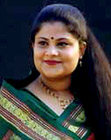
Song of Love – Part II

Indian classical music, with its strong foundation of faith, spirituality and mysticism is steeped in love. The love for both Creator and Creation are considered as Divine and music is the deepest and most eloquent expression of that love.
The Nava Rasas or nine primary emotions expressed in Indian fine arts, including music, dance, poetry, prose, drama, art and sculpture are - Shanti (Peace), Shringara (Sensuality), Haasya (Mirth), Karunya (Compassion), Bhayanaka (fear), Bhibhatsa (Grotesque), Adbhuta (Amazement), Veerya (Heroism) and Raudra (Anger). Ultimately, these moods and emotions are all tied to Divinity and love. An eternal quest to attain salvation and freedom from worldly pleasure, pain and sorrow has been the basis of artistic creation in our ancient country from time immemorial. Divine love or Bhakti has been the underlying emotion, ambition and goal and music is accepted as one of the primary paths to achieve salvation or become one with Paramatma (Almighty).
The 12th-century poet and mystic Jayadeva, who lived in Orissa, authored a beautiful treatise on the profound love of Radha and Krishna called “Geeta Govinda.” This beautiful work of religious poetry has been composed into couplets arranged in verses of eight, hence known as 'Ashtapadi'.
Saint Jayadeva's “Geeta Govinda” has been set to music and performed by countless singers and amalgamated into Indian classical dance forms such as Bharatanatyam, Kuchipudi, Kathak, Odissi, Manipuri, Mohini Attam and so on. The most famous and recognizable rendition of the Ashtapadi is by legendary doyen of Karnatik (South Indian) classical music – the late great vocalist M.S.Subbulakshmi. The mellifluous crux of Saint Jayadeva's spiritual composition and Subbulakshmi's equally captivating and elevated rendition is the reverberating refrain 'Jaya Jagadeesha Hare': a phrase paying obeisance to the Lord of the Universe.
The tradition of Krishna-Bhakti (devotion), prayer and love spread by poet-saints of the Bhakti movement or spiritual revolution in medieval India continue to this day. The love manifest in the mesmerizing bhajan renditions of the inimitable maestro Pandit Bhimsen Joshi rings clear and true. “Madhukar Shyam Hamare Chor,” “Chalori Murali Suniye,” “Chaturbhuja Jhoolata Shyama” are a few such devotional compositions.
Ashwini Bhide – an accomplished vocalist of the Jaipur-Atrauli Gharana or school of Hindustani classical music has rendered some esoteric Krishna bhajans that are readily accessible listening experiences. Bhide’s flawless singing of the Madhurashtakam – a lyrical treatise by Saint Vallabhacharya enumerating the beauty of the Lord – is one such example. The Bhaktimala series of albums contain some gems such as “Kaise Hori Machayi Kanhayi” – Krishna playing the colorful festival of Holi with his lovers and devotees – and “Sundara Badana Sukha Sadana Shyaama” – naming the attractive/alluring attributes of a resplendent Lord Krishna – the evergreen epitome of Love.
To be continued …
Lavanya Dinesh, an accomplished performer and teacher of Hindustani classical vocal music, lives in Tampa. She regularly performs at musical venues in India and the United States. The singer has three album releases to her credit. She can be reached at [email protected]